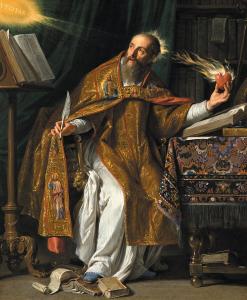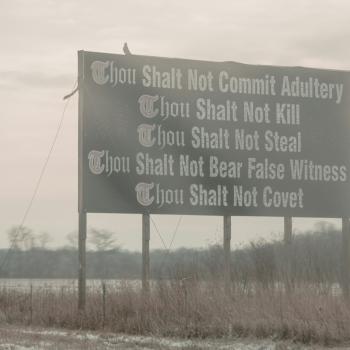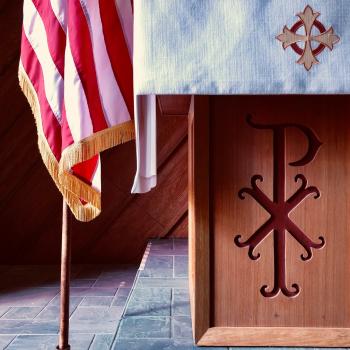Augustine’s City of God is a foundational text in Christian political thought. Augustine developed many important concepts and principles rooted in Scripture and Tradition. As modern Christians, we would do well to draw what we can from this ancient text.
Here, we will explore what Augustine, in light of his socio-political context, had to say about peace. Is all peace good peace? Is all peace just? And is order at the expense of harmony and equality truly an order worth wanting? These are questions that moderns ask today. And it just so happens that these were questions running through Augustine’s mind, too.

1. Introduction
1.1 St. Augustine, Bishop of Hippo
St. Augustine of Hippo was a Catholic theologian and philosopher. He was born in 354 and went to be with God in 430. Though Constantine converted to Christianity in 312, even by Augustine’s time, Christianity was not yet the dominant religion of the Roman Empire. Christians were one group among many. In fact, they were a minority.
Augustine had an interesting testimony. He was born to an unbelieving father, Patricius, and a devout woman of faith, Monnica. As a child, his mother prayed for his salvation regularly. His family were Berbers, a group indigenous to North Africa.
The young Augustine attained a good education, first in literature and later in rhetoric. In his time at Carthage, he became promiscuous, chasing the desires of the flesh, so to speak. His history of sexual exploits would haunt Augustine in his later years, and would unfortunately taint his views of sexuality as a theologian. It was also in Carthage that Augustine became a Manichaean.
Manichaeanism was viewed as a Christian heresy but was really a religion all on its own. Mani, its founder, saw himself as a prophet preceded by the Buddha, Zoroaster (a founder of a religion to which Judaism owes its historical development), and Jesus Himself. According to Manichaeanism, the physical world is evil, and the spiritual realm is good. The soul had to be freed from the wicked, fleshly body to find freedom and liberation.
After meeting St. Ambrose, Augustine eventually found Christ. Soon, he became a bishop and went on to share his testimony in his book, The Confessions. Today, The Confessions is recognized by Christians as a spiritual classic, filled not only with Augustine’s testimony but with beautiful, emotional descriptions of God’s love and nature.
1.2 The City of God
As with all people, to discuss Augustine’s personal story is to discuss his political context. And to do so, The City of God is a great place to start.
In 410 (twenty years before Augustine would pass on), the Visigoths sacked Rome. For such a powerful empire, this was significant. The pagan Romans needed someone to blame for this catastrophe. So, just as native-born folks often blame immigrants for societal problems, the Romans blamed the new-coming Christians for the defeat. The argument went that Rome was doing just fine until Christianity showed up. And unless Rome rejected Christian modernity and embraced pagan tradition, so to say, Rome would continue to decline.
The City of God was therefore written as a defense or apologia. Indeed, the text’s full title is The City of God Against the Pagans. The book was originally written to Augustine’s friend, Marcellinus, a Christian official working in Africa. (If only Christianity’s African history were remembered more often!)
In The City of God, Augustine demonstrated that Rome’s “good ol’ days” of greatness weren’t so great after all. Rome had always suffered from moral decay and military defeat. It was only through forgetful nostalgia that Rome thought it should be made great again. Augustine also argued that in the grand scheme of history, Rome was only one empire among many. And as time passes, all empires fall. Just like humans, nations have their days numbered.
Therefore, Augustine concluded in his sweeping historical analysis, Rome was nothing special. And even if it was, it was not the Christians’ fault that it suffered at the hands of the Visigoths.
1.3 The Roman Cult
Before going on, we must briefly discuss Roman religion. For Rome, religion was closely related to the maintenance of social order. Basically, Rome had a deal with the gods, a quid pro quo. The attitude was, “we offer you sacrifices, and you give us victory.”
Thus, the Romans were not altogether distrustful of the gods of the peoples they conquered. They were not dogmatic or particular. As long as their subjects gave attention to the Roman gods, all was well.
A large reason why Christians and Jews were persecuted by the Romans (though in Judea, Rome was relatively permissive of Jewish religion) was because those religions rejected the existence and/or legitimacy of other gods. Therefore, Jews and Christians would not offer sacrifices to Roman gods, or recognize the emperor as a divine Lord. Only God is God. There are no others.
This was not a mere religious difference between the polytheists and the monotheists. According to Rome’s view of religion, this was also a political difference. If the old gods were no longer offered sacrifices or worshipped, how could Rome prosper? It is no wonder, then, that when the Romans saw their empire declining, they were quick to blame the Christians. After all, the Christians saw such national security as “idolatry.”
2. “No Justice, No Peace”: A Brief History
Having introduced St. Augustine, his City of God, and the Roman cult (“cult” for scholars just means religious “service,” such as “serving” gods through sacrifice or worship), we can now discuss a quite revolutionary idea in Augustine’s text. It is the idea of true peace, and false peace and its modern parallel.
“No justice, no peace” was a slogan that gained popularity following the murder of George Floyd in 2020. A White policeman Derek Chauvin, in the process of arresting Floyd, held Floyd down with his knee on the back of his neck for nine minutes and twenty-nine seconds. Pinned on the ground, Floyd cried out repeatedly while gasping for breath, “I can’t breathe.” Floyd’s last moments were viewed by millions online.
Months before Floyd had died, Ahmaud Arbery in Atlanta and Breonna Taylor in Louisville also lost their lives at the hands of police. The deaths of these Black Americans reinvigorated Black Lives Matter protests around the nation, and even around the world. The protests attempted to call time on police brutality and the racist prejudices, practices, and origins of the police system.
2.1 The Meaning of “No Justice, No Peace”
One of the phrases chanted in these protests was “no justice, no peace.” In our discussion of this phrase here, we’ll pull from Luigi D. A. Corrias’s analysis of it, accessible here on Taylor and Francis.
Corrias points out that the slogan is not pre-scriptive, but de-scriptive. If it were prescriptive, the protestors would be saying, “If there is no justice (e.g., in the US police system), then we will disturb the peace with our protests and demonstrations.” Rather, the protestors were saying that “Since there is no justice, there is therefore no peace to disturb.”
Indeed, protestors are often accused of disturbing the peace. Why not let it alone, whatever the problem is? Why cause a ruckus? This is true now for those who protest in support of the Palestinians suffering under the modern State of Israel. It was the case when White Christians accused Black Christians of being “disturbers of the peace” during the Civil Rights Movement, as Dr. Martin Luther King, Jr. mentioned in his 1963 Letter from Birmingham Jail.
As Corrias discusses, “no justice, no peace” expresses that “Black Americans are aliens in their own legal order.” Yes, Americans can have the same rights and be subject to the same laws, but are those rights and laws applied justly? Given the racial disparities regarding police brutality and police misconduct, which can be explored here at this University of Illinois research guide, it is clear that there really is no justice for all. And therefore, there is no peace.
The Black Lives Matter protests, though some caused considerable property damage, did not so much “disturb the peace” as they did reveal the lack of peace that Black Americans have long suffered in the US.
3. Augustine’s City of God on Justice and Peace
Responses from certain White Christians against the Black Lives Matter movement eerily paralleled White Christian responses to the Civil Rights movement in the 60s.
King in his Letter from Birmingham addressed “the white moderate, who is more devoted to ‘order’ than to justice; who prefers a negative peace which is the absence of tension to a positive peace which is the presence of justice.” Though the White moderates had decent ideals, ultimately they couldn’t stand for what Black Americans were calling for and how they intended to achieve it.
And then there were White pastors like Jerry Falwell, founder of the Moral Majority. Falwell gave an entire sermon criticizing King titled “Ministers and Marches.” Falwell questioned “the sincerity and non-violent intentions of some civil rights leaders such as Dr. Martin Luther King Jr. . . . and others, who are known to have left-wing associations.” Instead, Falwell insisted that the only way to improve society was not through improving laws, but by making more Christians, even though there were many Christians who were against the desegregation of schools, and others who were blatantly racist in those times.
So too did some Christians respond negatively towards the Black Lives Movement in 2016 and 2020. In 2020, for example, an evangelical seminary declared that the movement had a “godless agenda.” Broadly, the movement was condemned for being “woke,” fueled by cultural Marxism, and so on. They saw the slogan, “no justice, no peace,” as threatening or dangerous.
Yet, these Christians had quite un-Christian notions of justice and peace. And it is here that we now turn to Augustine’s City of God once again.
3.1 Augustine on War and Peace
We shall recall that Augustine wrote City of God during a time of imperial upheaval and social unrest. The main accusation he was responding to was that Christianity had ruined the Roman peace (pax Romana), similar to the modern accusation against Black Americans and others for disrupting the peace by talking about racial injustice.
One facet of Augustine’s response was to reevaluate the nature of peace. Is peace simply an absence of war? Is all peace good?
For Augustine, not quite. There exists what he calls a “ruthless peace.” In Book III, he says that the Romans were capable of having a peace that was actually worse than war.
Whereas war is waged between two equals (we might think of two boxers fighting in a ring), the so-called Roman peace relied on oppressing those who could not fight back. Augustine, in John O’Meara’s translation, puts it this way.
Peace and War had a competition in cruelty; and Peace won the prize. For the men whom War cut down were bearing arms; Peace slaughtered the defenseless. The law of War was that the smitten should have the chance of smiting in return; the aim of Peace was to make sure not that the survivor should live, but that he should be killed without the chance of offering resistance (City of God, III.28).
4. Connecting Augustine to Today’s Political World

In closing, we draw Augustine’s idea of “ruthless peace” to today’s world. Somewhere in Christian history, we sacrificed justice for ruthless peace. We would rather not “stoke the flames,” and let well enough alone.
This happens on the scale of the family. Oftentimes, some will not call out an abuser for abusing other family members in order to “keep the peace” or not start drama. In the local church, some would rather let pastors slide for committing scandalous acts against congregants, rather than holding them accountable and restoring justice to the life of the church.
On the city, state, and national levels, some Christians would rather be content with societal conditions that sap the life of their neighbors. They would rather not correct what is wrong in the laws, policies, or practices of the culture. Instead, they opt for a quietist Christianity committed to keeping law and order, rather than advocating for just laws and harmony.
The objection will always be raised that we can never bring heaven down to earth. And this is true. But are we justified in being content with letting our societies decay? Are we not called to be salt to preserve that which is dying? And some say that we will always have the poor with us. But does this keep us from serving our impoverished and disenfranchised neighbors? Yes, there will always be imperfections in this world, but if we have the power to ameliorate and even correct those imperfections, why don’t we?
Let us never become complacent with an unjust peace. And let us never forget that law and order does not equate to the flourishing nature of God’s divine law which gives true peace to the universe.













